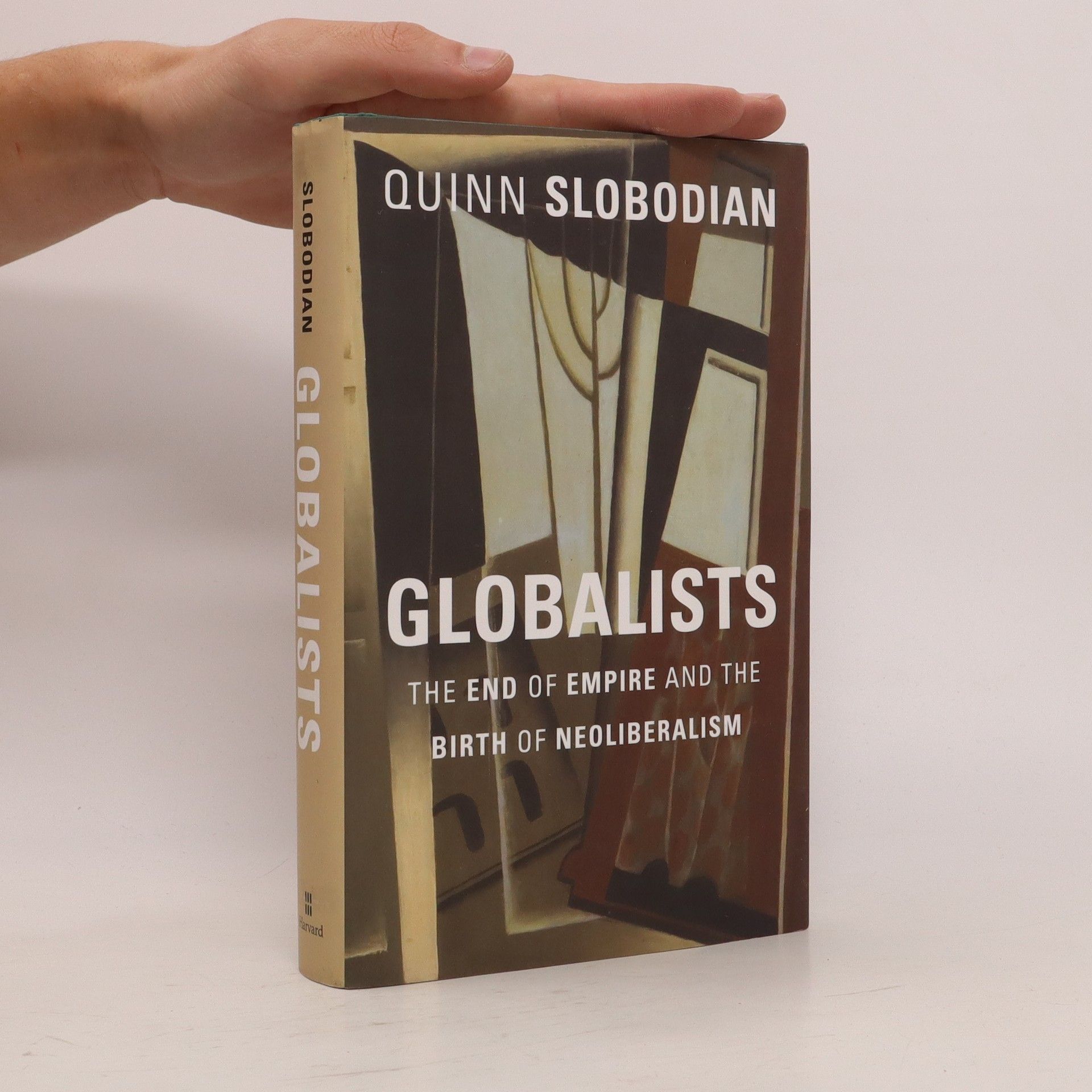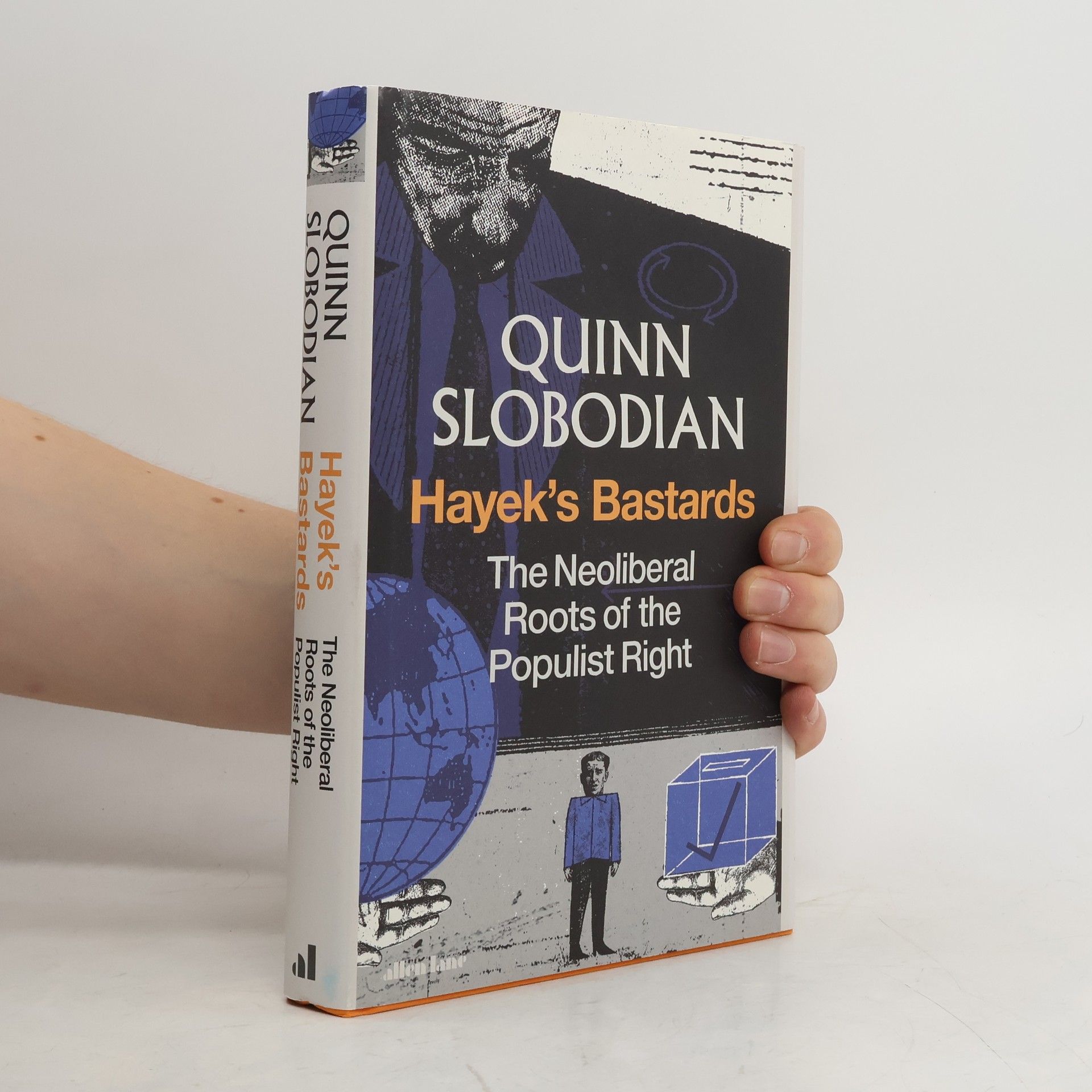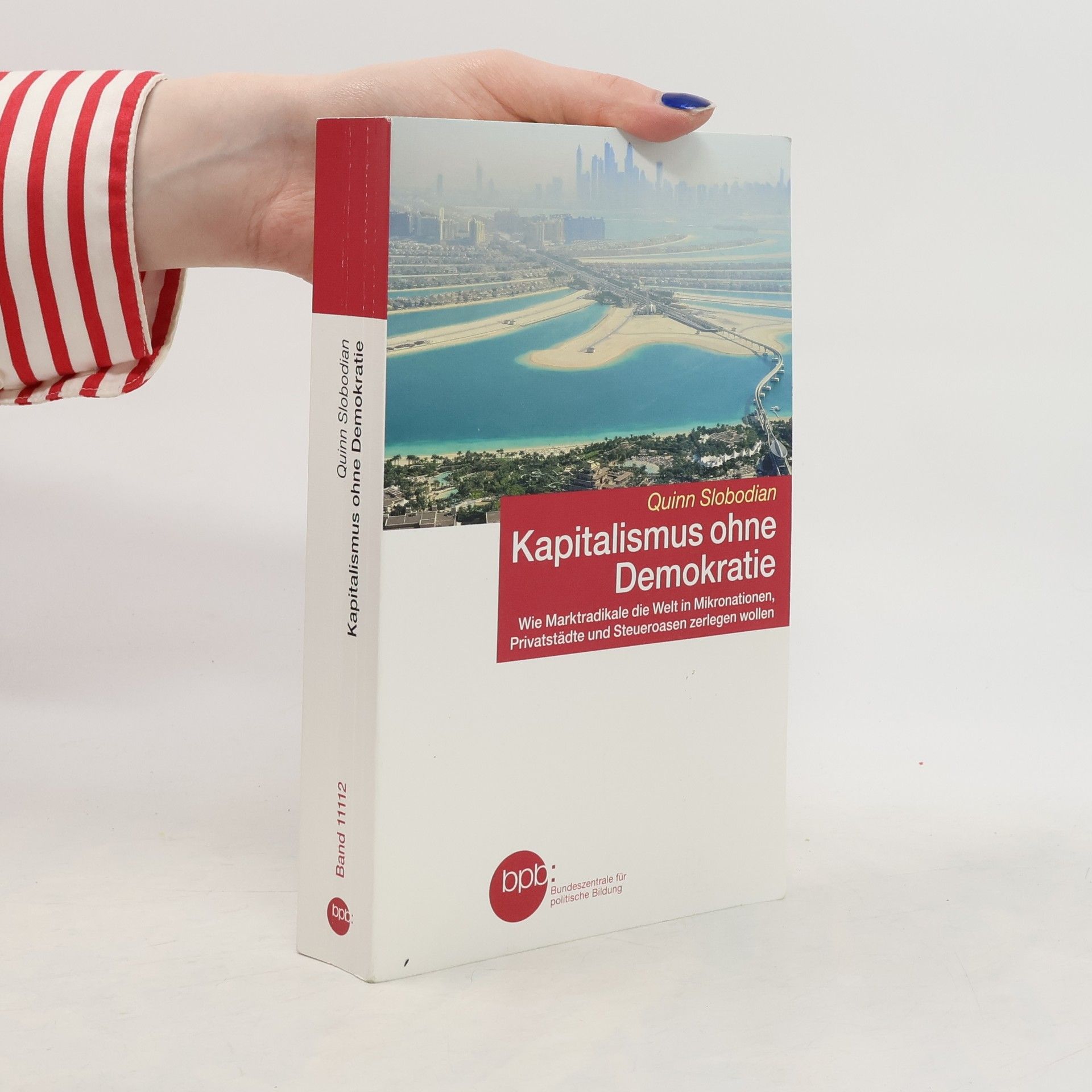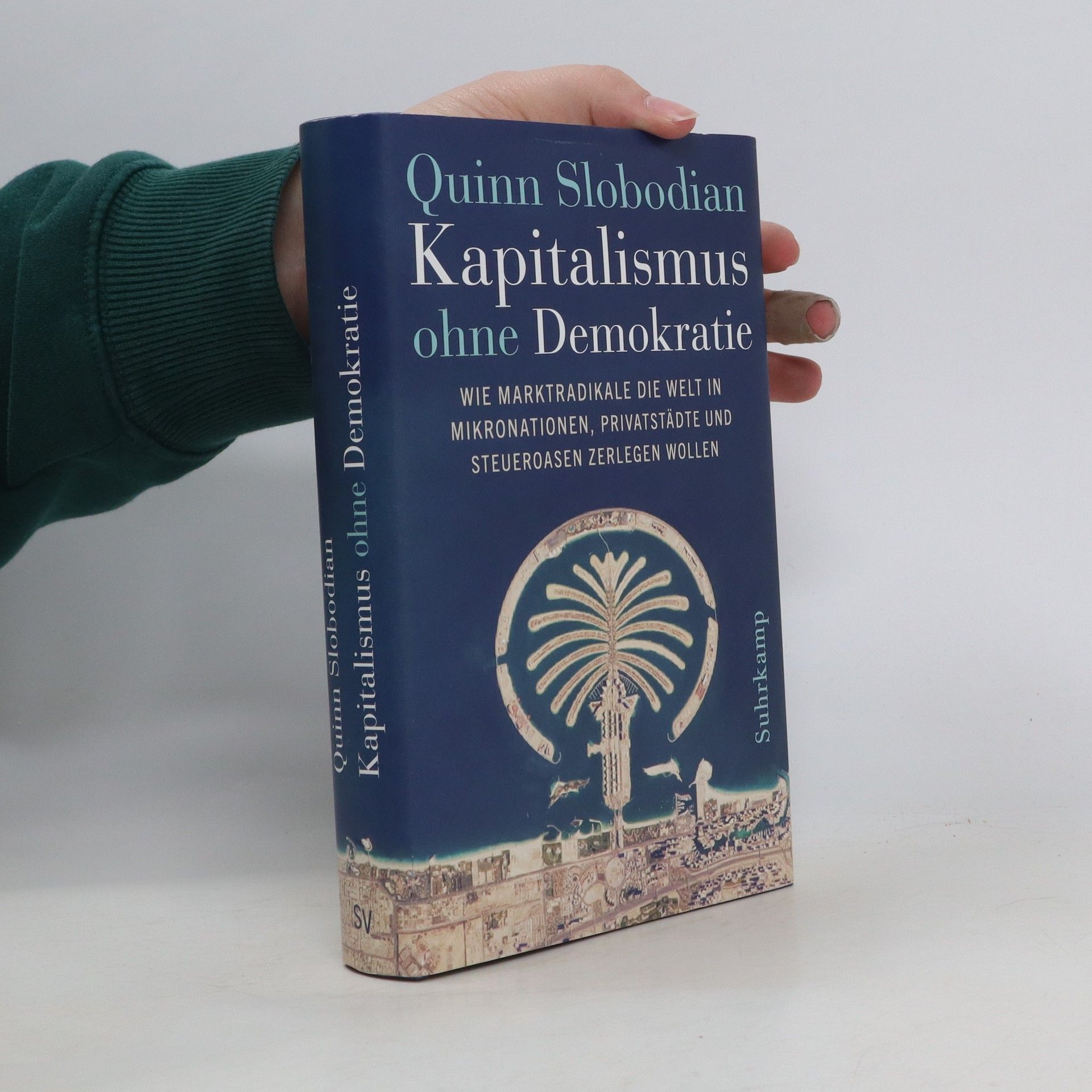In seinem fesselnden Buch, das international für Furore gesorgt hat, wirft Quinn Slobodian einen neuen Blick auf die Geschichte von Freihandel und neoliberaler Globalisierung. Im Mittelpunkt steht dabei eine Gruppe von Ökonomen um Friedrich von Hayek und Wilhelm Röpke, die aus einer Außenseiterposition heraus die Deutungshoheit eroberten. Getrieben von der Angst, nationale Massendemokratien könnten durch Zölle oder Kapitalverkehrskontrollen das reibungslose Funktionieren der Weltwirtschaft stören, bestand ihre Vision darin, den Markt auf der globalen Ebene zu verrechtlichen und so zu schützen.
Quinn Slobodian Bücher






Kapitalismus ohne Demokratie
Wie Marktradikale die Welt in Mikronationen, Privatstädte und Steueroasen zerlegen wollen
- 427 Seiten
- 15 Lesestunden
Freiheit und Demokratie, so der Investor Peter Thiel 2009, seien nicht länger kompatibel. Wer die Freiheit liebe, müsse daher versuchen, der Politik in all ihren Formen zu entkommen. Zuflucht suchen könnten Libertäre im Cyberspace, im Weltraum und auf dem offenen Meer. Das mag verblasen klingen, steht aber in einer jahrzehntealten Tradition marktradikaler Ideen: Denker wie Milton Friedman begeisterten sich für das noch unter britischer Oberhoheit stehende Hongkong; Margaret Thatcher träumte von einem Singapur an der Themse. In seinem Buch Globalisten hatte sich Quinn Slobodian mit Versuchen befasst, ökonomische Fragen der demokratischen Willensbildung zu entziehen, etwa durch ihre Übertragung an internationale Organisationen. In Kapitalismus ohne Demokratie geht es nun um eine andere Lösung für das von Thiel beklagte Problem: die Zerschlagung der Welt in Steueroasen, Privatstädte oder Mikronationen. Quinn Slobodian nimmt uns mit auf eine faszinierende Reise durch die Welt der neoliberalen Utopien. Sie führt nach Dubai und Liechtenstein, ins vom Bürgerkrieg zerrüttete Somalia und zu Elon Musks texanischem Weltraumbahnhof. Und sie weitet den Blick auf eine mögliche Zukunft, die uns Sorgen machen sollte.
Globalists
- 400 Seiten
- 14 Lesestunden
George Louis Beer Prize Winner Wallace K. Ferguson Prize Finalist A Marginal Revolution Book of the Year “A groundbreaking contribution...Intellectual history at its best.” —Stephen Wertheim, Foreign Affairs Neoliberals hate the state. Or do they? In the first intellectual history of neoliberal globalism, Quinn Slobodian follows a group of thinkers from the ashes of the Habsburg Empire to the creation of the World Trade Organization to show that neoliberalism emerged less to shrink government and abolish regulations than to redeploy them at a global level. It was a project that changed the world, but was also undermined time and again by the relentless change and social injustice that accompanied it. “Slobodian’s lucidly written intellectual history traces the ideas of a group of Western thinkers who sought to create, against a backdrop of anarchy, globally applicable economic rules. Their attempt, it turns out, succeeded all too well.” —Pankaj Mishra, Bloomberg Opinion “Fascinating, innovative...Slobodian has underlined the profound conservatism of the first generation of neoliberals and their fundamental hostility to democracy.” —Adam Tooze, Dissent “The definitive history of neoliberalism as a political project.” —Boston Review
Globalists: The End of Empire and the Birth of Neoliberalism
- 400 Seiten
- 14 Lesestunden
Neoliberals are often perceived as opponents of the state, yet their history reveals a more complex relationship. In this intellectual exploration, Quinn Slobodian traces the evolution of neoliberal globalism from the aftermath of the Habsburg Empire to the establishment of the World Trade Organization. He argues that neoliberalism did not aim to diminish government or eliminate regulations but sought to reposition them on a global scale. Beginning in 1920s Austria, amidst the disintegration of empires and the rise of nationalism and socialism, Austrian thinkers advocated for a new global order. Key figures, including Friedrich Hayek and Ludwig von Mises, along with lesser-known economists like Wilhelm Roepke and Michael Heilperin, rejected a laissez-faire approach. Instead, they leveraged states and international institutions—such as the League of Nations, the European Court of Justice, and international investment law—to shield markets from sovereign states and the demands for equality and social justice. Slobodian highlights that neoliberals aimed to utilize regulatory frameworks to safeguard capitalism globally. This ambitious project reshaped the world but was repeatedly challenged by the inequalities and social injustices it generated.
Crack-Up Capitalism
- 352 Seiten
- 13 Lesestunden
'Gonzo brilliance ... unique and highly entertaining' Financial Times 'Revelatory reading' Adam Tooze, author of Crashed 'After reading Quinn Slobodian's new book, you are not likely to think about capitalism the same way' Jacobin Look at a map of the world and you'll see a neat patchwork of nation-states. But this is not where power actually resides. From the 1990s onwards, globalization has shattered the map, leading to an explosion of new legal entities: tax havens, free ports, city-states, gated enclaves and special economic zones. These new spaces are freed from ordinary forms of regulation, taxation and mutual obligation - and with them, ultracapitalists believe that it is possible to escape the bonds of democratic government and oversight altogether. Historian Quinn Slobodian follows the most notorious radical libertarians - from Milton Friedman to Peter Thiel - around the globe as they search for the perfect home for their free market fantasy. The hunt leads from Hong Kong in the 1970s to South Africa in the late days of apartheid, from the neo-Confederate South to the medieval City of London, and finally into the world's oceans and war zones, charting the relentless quest for a blank slate where capitalism and democracy can be finally uncoupled. Crack-Up Capitalism is a propulsive history of the recent past, and an alarming view of our near future.
This study offers a comprehensive examination of neoliberalism's advocates in Eastern Europe and the Global South, addressing the origins of free market ideology. While recent scholarship on the Mont Pelerin Society has enhanced our understanding of the interplay between ideas, interests, and institutions, it often reflects a Eurocentric perspective. The narrative typically portrays neoliberalism as a diffusion of ideas from the Global North to the periphery, with notable exceptions like Chile under Augusto Pinochet. However, the existing literature predominantly features a limited cast of influential figures, such as Milton Friedman and Friedrich Hayek. This work seeks to rectify that by highlighting a diverse array of voices from the Global South and Eastern Europe involved in the transnational neoliberal movement. It includes figures like B.R. Shenoy from India, recognized for his role in the Mont Pelerin Society, and Manuel Ayau, founder of Marroquin University in Latin America. Additionally, it explores how Chinese intellectuals adapted Hayek and Mises to their contexts. By examining neoliberalism from outside the industrial core, the study reveals the appeal of radical capitalism to various populations and how their innovative policy ideas were localized.